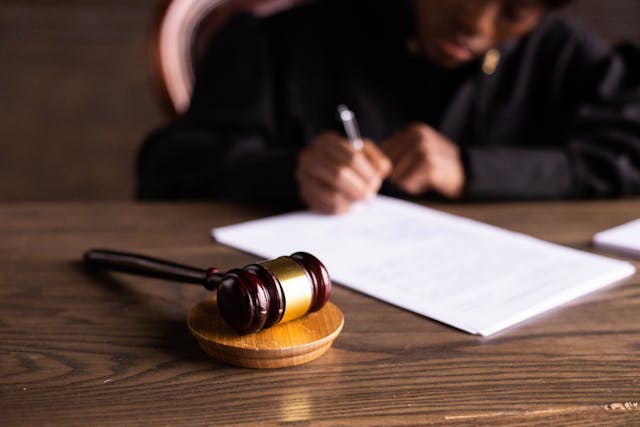The nuances of how unpaid rent materializes into a legal issue may differ per jurisdiction, but there exist universal components worthy of exploration. If a tenant fails to remit their rental fee over an extended duration, the landlord is typically inclined to initiate a formal procedure with the intention of rectifying the predicament or potentially ousting the tenant. The utterance – “My landlord is dragging me to court due to unpaid rent” – could potentially shatter tenants’ serenity and suggests that these preliminary stages of this process have significantly progressed.
Inevitably, the pivotal element in such legal entanglements involving overdue rent lies within the lease agreement inked by both stakeholders. This document meticulously delineates specific obligations for each party involved which include stipulated monthly payments from tenant to landlord, conditions surrounding payment and repercussions in instances where said payments are missed. Consequently, if you find yourself compelled to state: “My landlord is hauling me before a judge for outstanding rent,” it would be prudent at this juncture to review your lease agreement thoroughly in order understand potential routes forward as well as any impending legal fallout.
The Process Behind Legal Action for Rental Arrears
First and foremost, it behooves us to grapple with a pressing query, “Does the legal framework in Pennsylvania permit landlords to initiate lawsuits for delinquent rental payments?” A direct response to this would be an emphatic yes. As delineated by the legislation of Pennsylvania, landlords are unequivocally granted the authority to take legal action against tenants who default on their rent.
However, before embarking on such a course of action, there’s an essential preliminary step that must be taken by the landlord. This involves issuing formal notification – generally known as a ‘Notice to Quit’ – which meticulously spells out details regarding the arrears owed and provides a specific timeframe – mandated at 30 days within PA jurisdiction- either for settling these outstanding dues or vacating the residence.
As we delve deeper into Pennsylvania’s legislative context concerning this matter, we find that initiating litigation necessitates submitting a complaint at an appropriate Magisterial District Court or Municipal Court within state boundaries. This document should encapsulate all pertinent specifics pertaining to tenancy agreements like rent quantum and payment frequency besides highlighting crucial information about unpaid amounts.
Subsequently, court authorities issue formal notification directed towards tenant(s) implicated in said lawsuit; they’re provided with a window period of ten days to submit their defense or counterclaim against allegations levied by their landlord. Henceforth unfolds an intricate web of proceedings wherein both parties’ interests and rights are carefully considered throughout each stage.
Examining the Court Summons for Overdue Rent

Grasping the labyrinthine realm of unpaid rent circumstances often introduces a recurring conundrum: what time allocation is granted to landlords for litigation regarding overdue rent? This duration varies notably, intertwined with local rental regulations and expiration laws. Commonly, this window ranges from one to four years post-due date of the rent. Landlords are thrust into an expedited journey through their jurisdiction’s legal maze when tenants slip into arrears. Swift action is critical in issuing a court summons while evading surpassing the cut-off for initiating legal proceedings.
This summons serves as a formal plea from landlords imploring court intervention in compelling tenant repayment of delayed rents. A meticulous dissection of such a summons unveils subtle revelations about crucial details – outstanding rental amount, length during which the rent has accumulated, and deadline set for tenant response. The receipt of this judicial missive demands immediate tenant reaction; failure to acknowledge might tilt countries towards automatic landlord favoritism.
Deciphering the Legal Documentation Associated with Rent Disputes
In the realm of unsettled rent, a persisting conundrum often echoes – “what recourse does a landlord have against unpaid rent?” To unsnarl this enigma, we must plunge into the labyrinthine universe of legal paperwork that commonly intertwines with rental disagreements. Each jurisdiction crafts specific rules delineating a property owner’s privileges and responsibilities concerning belated rent. Such enactments generally empower landlords to initiate eviction processes once rent enters arrears. For instance, comprehensive demand letters can be dispatched to tenants along with eviction or termination notices. These documents operate as formal correspondences underscoring the gravity of circumstances while concurrently setting up foundations for potential judicial intervention.
To wholly grasp these papers, it is indispensable to decode their language and implications. A Demand Letter functions as an official solicitation for overdue payment, for example. If delinquent rent persists, an Eviction Notice or Notice to Quit might be rolled out next; essentially serving as cautionary advice for tenants either to redress the issue within stipulated timeframes or brace themselves for ejection from premises. Contrarily, termination notice spares no room for redemption via outstanding balance settlement in order to evade eviction – it merely proclaims that due to consistent failure in remitting rents by tenant(s), the landlord has resolved on terminating tenancy agreement.
Roles and Responsibilities: How Attorneys Can Assist in Rental Litigation
To unravel the intricate and multifaceted enigma of rental litigation, both landlords and tenants may find themselves embarking on a potentially overwhelming journey. At the heart of a landlord’s labyrinthine concerns often lies one central query – “Can I pursue legal action for back rent post-eviction?”. The response is seemingly straightforward – yes. Yet, navigating towards a triumphant resolution within such lawsuits unveils layers of complexity that typically require the navigation skills of an experienced rental litigation attorney.
These attorneys shoulder the task of decrypting legalese, scrutinizing evidence with laser-like precision, and architecting powerful strategies to safeguard their clients’ rights. Incessantly they labor to construct an invincible case framework, capitalizing on their exhaustive knowledge base and nuanced understanding of the intricacies embedded in rental and eviction laws. Specifically when a landlord seeks to legally claim back rent following eviction proceedings, these seasoned warriors can offer vital support.
Attorneys ensure every step taken adheres strictly to legal protocols while positioning their client’s claim for maximum efficacy in court trials. Thus enabling landlords not only understand but also maneuver through this perplexing realm with burstiness intensity that echoes success.
Preparing Your Defense: Strategies for Court Hearings
In the labyrinthine world of litigation, crafting a compelling and resilient defense forms a pivotal cog in the machinery. As we delve into the sphere of rental arrears, this stage necessitates not just an intellectual grasp of legal topography but also meticulous attention to minutiae and strategic foresight. The cornerstone for an unshakeable presentation at court hearings is frequently entrenched in painstakingly collating and dissecting all germane evidence – spanning from mundane bank statements to communication trails with property owners, contracts, or any other paperwork potent enough to fortify your standing.
Engaging in a lawsuit over unpaid rents isn’t merely about following protocols; it’s akin to strategizing on a chessboard where each move can tilt victory scales. Appreciating your statutory rights as well as duties as an occupant becomes crucial here. Scrutinizing lease agreements with precision lenses and comprehending their intricate details could potentially steer the proceedings’ trajectory. Moreover, taking under your wing professional counsel from an attorney well-versed in rental litigations may significantly tip the odds in your favor.
They bring along invaluable acumen to weave together legible narratives of your case succinctly yet convincingly, call out discrepancies lurking within landlord’s assertions skillfully while guiding you across tortuous judicial terrain with increased surefootedness.
Navigating the Court Proceedings: What to Expect
Stepping into the austere confines of a courtroom for a tenancy disagreement can initially strike as bewildering, an onslaught of legalese, persuasive legal representatives and stern-faced arbiter dominating the area. To maneuver through this environment with dexterity demands comprehending the intricate procedural blueprint of a court trial. The legal odyssey initiates with attorneys representing both plaintiff and defendant unfurling their opening statements. These declarations aim to delineate their cases in an exact, terse fashion; thus laying down groundwork for what will transpire as an intense skirmish involving meticulous scrutiny of evidence, witness depositions, and formidable debates steeped in law.
Within the unfolding drama within the courtroom arena, there’s an unbroken stream of evidentiary documents and arguments that are paraded before the judge whose task is to impartially dissect and construe these fragments based on pertinent rental laws governing landlord-tenant relationships. It’s typical enough during such disputes that landlords or tenants ascend to give testimony from where they stand—recounting events from their perspective—often subjected to aggressive cross-questioning by attorneys—the norm during deposition sessions.
By grasping fully what transpires during such court proceedings allows involved parties better handle not just stress but also uncertainties that go hand-in-hand when dealing with legal face-offs.
Here are some key points to keep in mind:
• The courtroom proceedings begin with attorneys from both sides giving their opening statements. These statements aim to provide a concise and precise overview of the case, setting up the stage for an intense battle involving careful examination of evidence, witness testimonies, and vigorous debates grounded in law.
- As the court drama unfolds, there is a continuous flow of evidentiary documents and arguments that are presented before the judge. It is the judge’s responsibility to impartially analyze and interpret these pieces based on relevant rental laws governing landlord-tenant relationships.
- During such disputes, it is common for landlords or tenants to testify—recounting events from their viewpoint—which often leads them subjected to aggressive cross-examination by attorneys—a standard procedure during deposition sessions.
- Understanding fully what happens during such court proceedings allows involved parties better manage not only stress but also uncertainties associated with legal confrontations.
Understanding this procedural blueprint can help individuals navigate through court trials more effectively:
- Prepare thoroughly: Understand your case well; research similar cases if possible.
- Seek professional advice: Consult with a lawyer who specializes in tenancy disagreements.
- Be prepared for grueling sessions: Courtroom procedures can be lengthy and mentally draining.
- Maintain composure: Stay calm under pressure; remember that being respectful goes a long way.
- Understand your rights as well as responsibilities: This will ensure you’re not taken advantage of at any point during the trial.
FAQ
Failure to pay rent punctually is construed as contract violation in most legal precincts. The entailed legalities encompass issuing notifications to erring tenants, potential eviction procedures, and possible legal recourse for recovering outstanding amounts.
This process generally entails the landlord intimating the tenant about their missed payment(s), followed by an allowance period. If payment isn’t made within this timeframe, landlords might opt for enforcing their rights legally. However, specifics can differ based on jurisdictional laws and individual rental agreements’ stipulations.
A court summons concerning overdue rent represents a formal notification issued by the judiciary that mandates tenant’s presence in court at a specified date. This document typically delineates charges against them, provides context regarding the basis of these complaints legally speaking and spells out repercussions should they fail to heed this summons.
Legal documentation would usually comprise lease or tenancy agreement papers; any written correspondence between involved parties (landlord-tenant); evidences demonstrating either fulfillment or defaulting of payment obligations; along with potentially relevant judicial notices or filings.
Attorneys are equipped to offer sound advice from a legal standpoint; act as representatives during courtroom sessions; work towards achieving settlements through negotiation; and aid in executing awarded judgments/consent orders effectively.
One’s strategy ought to fit snugly around case-specific circumstances – such as marshalling proof regarding paid dues if applicable ; contesting declared amount; showcasing efforts to resolve the matter amicably outside court; or invoking legal defenses like inadequate notice, inhabitable conditions etc.
The usual practice in court involves both parties stating their respective cases before a judge who then proceeds to evaluate submitted evidences and counter-claims. You may have to bear testimony under oath, answer queries posed by the judge. Depending on case-specific details, verdicts can range from monetary judgments for due amounts , eviction orders or other appropriate rulings.



